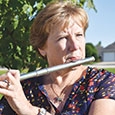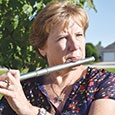Regina Helcher Yost wrote in the January 2018 issue about proper etiquette in the flute world. She stated some excellent points that add to a player’s professionalism and contribute to success and congeniality in the section and orchestra when subbing or when in a new position. Many of us are not in the professional world but very happily play with friends, in community groups, local orchestras, bands and wind ensembles. We love using the skills we honed as students and continue to work for improvement.
At times those local groups need a sub, and you, as an excellent, reliable flutist, might get called. I have been on both sides of the call. I have been asked to sub, and I have also needed to call in some help. All of the items Ms. Yost talked about apply, but there are a few other points I would like to mention for those working with a community group.
If you live in the area, you may know people in the group or who have subbed with them. Ask them for a heads up about the level or climate of the ensemble. Remember that no matter what you see as the level of the group, these are people who love to play music and are trying to do their best. They know you have been called in, perhaps at the last minute, because you can handle it. You don’t need to show them that you are better.
When you arrive, introduce yourself to the section. If you don’t already have your assigned part, accept what you are given.
When warming up, don’t show off your fast runs or fancy repertoire. If you are not playing principal, don’t run through the principal’s solos.
You might be a better player than the principal or others in your section. Don’t fret over that or get an attitude. Just blend in with them. That person’s spouse, parents, kids, or friends came to hear them play the solo, not you.
Be cautious about offering suggestions or corrections. Just play your part correctly. After hearing you, they might figure it out. At this level, things might not come on the first try but they usually do come. Compliment a part well played. If there is a point where you can help, offer it as a suggestion.
Don’t send a bad look when someone makes an error. They are all trying. The people in the ensemble may have full-time (non-music) jobs, kids, and not a lot of practice time but they are there every week. Some have more love and loyalty than skills. The regulars can get a bit frustrated too – at themselves or others. There is that person who has been there for 30 years and is past their prime. Or the one who doesn’t have an ear for tuning. Appreciate their efforts and dedication.
I have been on both sides and met some terrific new people while subbing. I also have had kind flutists come in to my ensembles who I know are far more skilled than I am, but who let me play my part and do my best – because this is my chance to do what I love. I appreciate them. I try to learn from them and I thank them for contributing to our organization. Remember, we are all doing our best and loving every bit of it. – Lynn Hansen
Send questions, comments, and ideas to editor@flutetalkmagazine.com.






